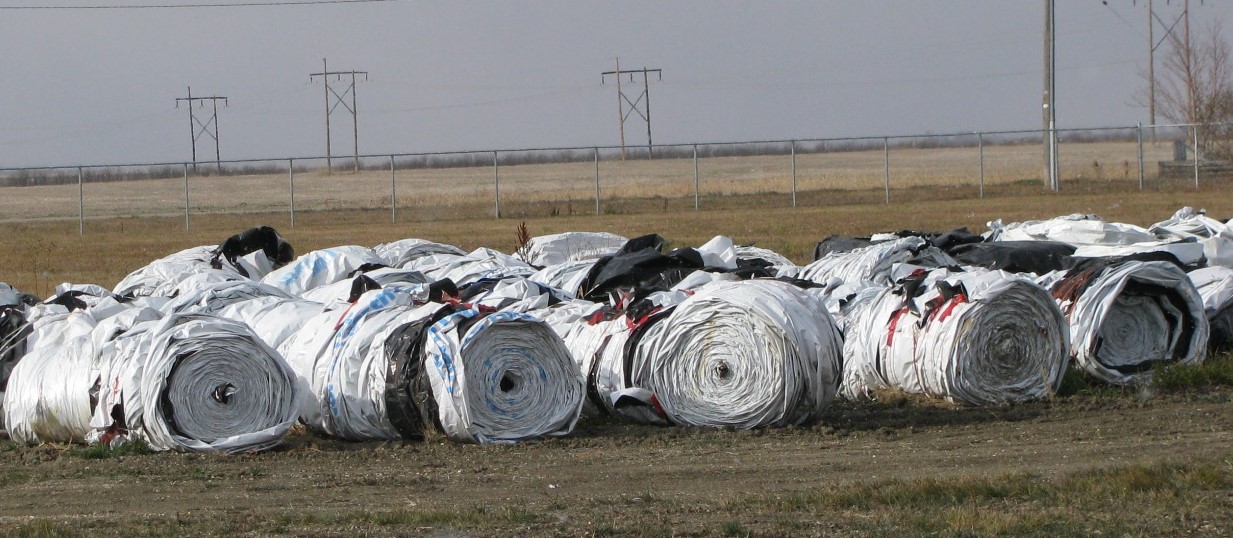2019 Saskatchewan Grain Bag Recycling Rate Already Surpasses 2018 by 25%
MOOSE JAW, SK – Halfway through 2019, and with one of the busiest periods of grain bag recycling still ahead, Saskatchewan farmers have already recycled 25% more grain bags in 2019 than they did in all of 2018, recycling program operator Cleanfarms announced today.
Cleanfarms is a non-profit industry stewardship organization established 10 years ago to help Canadian farmers recycle or properly dispose of waste agricultural plastic and other waste materials generated on farms.So far this year, Saskatchewan farmers have turned in almost 1,580 tonnes of used, empty grain bags for recycling. During the whole of 2018, the first year of the government-regulated program, the total collected for recycling was 1,265 tonnes.
“With 2019 only at the mid-way point and with a full harvest season ahead of us, we are expecting that we’ll see the year end with a very successful recycling program for grain bags in Saskatchewan,” predicted Cleanfarms’ general manager Barry Friesen. “We have Saskatchewan farmers to thank for that. We are very grateful they are getting on board so enthusiastically with this recycling program.”
Across the province from Carievale to Meadow Lake, 34 municipalities and businesses are set up as Cleanfarms collection locations that accept grain bags under the recycling program.
To date this year, Cleanfarms has shipped 84 semi trailer loads of grain bags to a recycler in the southern U.S. where the bags are washed, shredded and the plastic pelletized so it can be used to make new products such as plastic bags. Each trailer load holds about 120 rolled grain bags meaning that more than 10,000 grain bags have been shipped for recycling so far this year.
As an example, the collection site at the Unity municipal landfill site – one of the busiest in the province – has already collected about 281 tonnes (281,000 kg) of grain bags so far this year. This translates into 16 semi trailer loads. An additional three loads are set to go in the next few days.
The recycling program for grain bags in Saskatchewan was established in July 2016 under The Agricultural Packaging Product Waste Stewardship Regulations, the first regulation of its kind in Canada. Through it, the province set the groundwork for a regulated recycling program similar to many other of Saskatchewan’s stewardship programs for products such as tires, electronics, paint and oil containers. The regulation transfers financial responsibility for proper disposal from the tax payer to businesses that supply grain bags into the market.
The recycling program applies an environmental handling fee (EHF) – in place since November 2018 – at the time of sale to help cover the cost of recycling the used grain bags. Specifically, the EHF is used to compensate collection sites for collecting the 113 kg plus, one-time-use bags; for loading and transporting them to end markets; and for administration. At 25 cents a kilogram, the EHF amounts to about $50 on a 10-foot by 300-foot grain bag, which can weigh close to 200 kgs and cost more than $1,100 dollars.
Cleanfarms operates the extended producer responsibility (EPR) grain bag collection and recycling program on behalf of the obligated industry.
Cleanfarms has developed a series of successful programs to recover and recycle or properly dispose of plastic ag waste and other farm waste materials including:
- Empty pesticide and fertilizer containers under 23 litres in size (Canada-wide)
- Empty pesticide and fertilizer containers over 23 litres in size (Canada-wide)
- Obsolete pesticides and animal health products (Canada-wide)
- Empty seed and pesticide bags (primarily in eastern Canada with pilots operating in the prairie provinces)
- Empty grain bags in Saskatchewan (along with operating a pilot program to start soon in Alberta)
(Original article posted on www.cleanfarms.ca by Barbara McConnell, August 15, 2019, Clean Farms)

